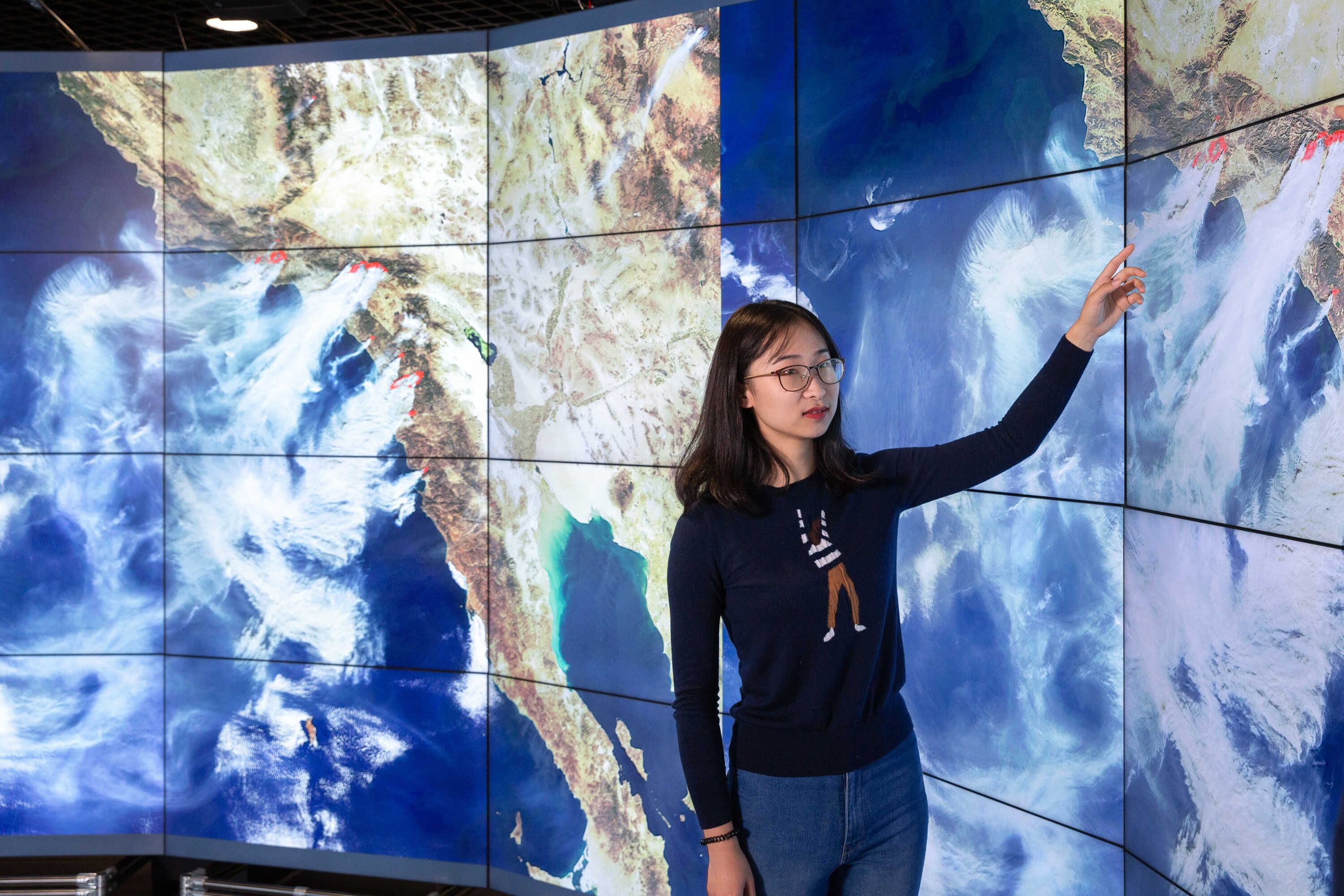
Renewable Energy with AI and Data Science: Geology and Geophysics
Apply computational techniques to geological and geophysical data to characterise sites for renewable energy.
Develop the essential AI and data science skills to solve renewable energy challenges
Get hands-on experience collecting offshore data
Secure industry insights on a work placement with companies engaged in the energy-transition
Course key facts
Qualification
MSc
Duration
1 year
Start date
September 2025
Study mode
Full-time
-
Fees
£23,400 Home
£43,800 Overseas
Delivered by
Location
-
South Kensington
-
Minimum entry standard
2:1 in any geological or physical science or engineering subject
Course overview
Gain the expert skills needed in geology, near-surface geophysics and computation, to characterise the shallow subsurface for a broad range of renewable energy applications.
You will examine how data science, numerical methods and machine learning can help solve problems in the renewable energy sector.
You will develop an understanding of the geological, geotechnical and geophysical knowledge and data essential to develop ground models for renewables projects.
You'll have the opportunity to apply these concepts to real-world settings on an offshore data-collection field trip and through an independent project in an area of your choice.
Exposure to industry will be provided through guest lectures, seminars and the option to conduct your independent project in an industry placement.
This course is suitable for those from a geoscience, physical science or engineering background looking to advance their computer science skills applied to renewable energy problems. This also includes those in industry looking to transition to the renewables sector.
Structure
This page is updated regularly to reflect the latest version of the curriculum. However, this information is subject to change.
Find out more about potential course changes.
Please note: it may not always be possible to take specific combinations of modules due to timetabling conflicts. For confirmation, please check with the relevant department.
You’ll take all of these core modules.
Core modules
Receive an introduction to numerical programming using Python and use it to understand, interpret and solve earth science problems.
Analyse concepts central to a data science approach and different types of classical machine learning algorithms.
Explore the essential mathematics underpinning computational science, data science and machine learning.
Work collaboratively to solve problems using software and summarise your work using presentations.
Discover how to describe and critique the main categories of machine learning methods.
Learn the fundamentals of subsurface properties and geological formations relevant for siting of renewable energy infrastructure and technology.
Investigate key depositional environments that renewables infrastructure are commonly installed in and the associated geohazards and engineering challenges.
Learn the theories of stress and strain, elasticity, poroelasticity, and thermoelasticity and gain exposure to geotechnical data analysis.
Gain hands-on experience in collecting and interpreting offshore high-resolution geophysical data and the development of ground models.
Teaching and assessment
Teaching and learning methods
-
Lectures
-
Seminars and formal presentations
-
Practical coding activities
-
Case studies
-
Group work exercises
-
Offshore fieldwork
Balance of assessment
Key
- Coursework and practicals
- Research project
- 67% Coursework
- 33% Projects
Assessment methods
-
Individual and group coursework
-
Research project report
-
Oral presentations
Entry requirements
We consider all applicants on an individual basis, welcoming students from all over the world.
2:1 in any geological or physical science or engineering subject.
Footnotes
Evidence of a good quantitative background (a minimum of a grade A in A-Level Mathematics, or evidence of mathematics programmes in your undergraduate degree) and coding experience are also required.
Special cases, based on relevant industrial/professional experience, may be considered in some circumstances.
How to apply
Apply online
You can submit one application form per year of entry. You can choose up to two courses.
Application deadlines – Round 3 closes on Thursday 15 May 2025
We operate a staged admissions process with several application rounds throughout the year.
Apply by 23.59 (UK time) on the closing date of an application round, to ensure you receive a response on your application by the relevant decision date.
Application rounds
Round 1
- Applications open on Friday 27 September 2024
- Applications close on Thursday 16 January 2025
- Decision by Thursday 6 March 2025
Round 2
- Applications open on Friday 17 January 2025
- Applications close on Thursday 27 March 2025
- Decision by Thursday 1 May 2025
Round 3
- Applications open on Friday 28 March 2025
- Applications close on Thursday 15 May 2025
- Decision by Thursday 17 July 2025
We strive to increase and broaden inclusivity and support everyone, regardless of background, in breaking down any barriers to your application the Department.
If you are interested in this MSc, we strongly encourage you to contact the postgraduate admissions officer prior to starting your application: ese-msc-ready@imperial.ac.uk.
There is no application fee for MRes courses, Postgraduate Certificates, Postgraduate Diplomas, or courses such as PhDs and EngDs.
If you are applying for a taught Master’s course, you will need to pay an application fee before submitting your application.
The fee applies per application and not per course.
- £80 for all taught Master's applications, excluding those to the Imperial College Business School.
- £100 for all MSc applications to the Imperial College Business School.
- £150 for all MBA applications to the Imperial College Business School.
If you are facing financial hardship and are unable to pay the application fee, we encourage you to apply for our application fee waiver.
Find out more about how to apply for a Master's course, including references and personal statements.
An ATAS certificate is not required for students applying for this course.
Fees and funding
Home fee
2025 entry
£23,400
You should expect and budget for your fees to increase each year.
Your fee is based on the year you enter the university, not your year of study. This means that if you repeat a year or resume your studies after an interruption, your fees will only increase by the amount linked to inflation.
Find out more about our tuition fees payment terms, including how inflationary increases are applied to your tuition fees in subsequent years of study.
Whether you pay the Home or Overseas fee depends on your fee status. This is assessed based on UK Government legislation and includes things like where you live and your nationality or residency status. Find out how we assess your fee status.
If you're a UK national, or EU national with settled or pre-settled status under the EU Settlement Scheme, you may be able to apply for a Postgraduate Master’s Loan from the UK government, if you meet certain criteria.
For courses starting on or after 1 August 2024, the maximum amount is £12,471.
The loan is not means-tested and you can choose whether to put it towards your tuition fees or living costs.
How will studying at Imperial help my career?
Learn key skills for a broad range of career options in the growing renewables industry and wider energy industry.
Meet the market demand for hands-on, applied data science knowledge.
Deepen your skills in artificial intelligence and machine learning, specifically applied to the renewable energy sector.
Pursue research or careers in climate science, sustainability, natural hazards, and renewable energy.
Employers will find your advanced knowledge of environmental science and engineering solutions particularly attractive.
Potential employers include small environmental and engineering consultancies to large multinational organisations, including those in the renewable energy and wider energy industry.
Further links
Contact the department
- Telephone: +44 (0)20 7594 9985
- Email: ese-msc-ready@imperial.ac.uk
Course Director: Dr Rebecca Bell
Postgraduate Admissions Officer: Sophie Pirouet
Visit the Department of Earth Science and Engineering website.

Request info
Find out more about studying at Imperial. Receive updates about life in our community, including event invites and download our latest Study guide.

Events, tasters and talks
Meet us and find out more about studying at Imperial.

Terms and conditions
There are some important pieces of information you should be aware of when applying to Imperial. These include key information about your tuition fees, funding, visas, accommodation and more.
You can find further information about your course, including degree classifications, regulations, progression and awards in the programme specification for your course.
Programme specifications